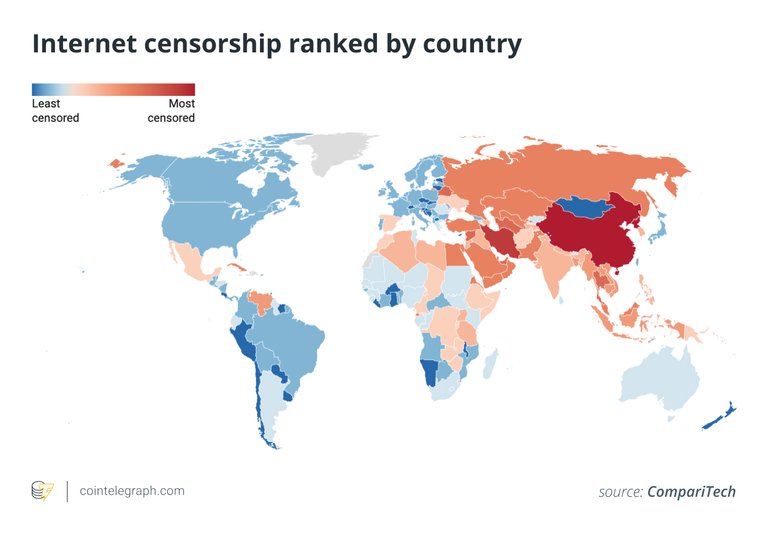Social Media Corporate Overseers Become Powerless Thanks to Web 3
Good bye Facebook and good bye Twitter. Don't let the door hit you in the rear on your way out. Yes my friends, there's a new kid in town - decentralized social media thanks to the continued development of Web 3.
Today’s social media landscape is dominated by Web2 corporations — mostly Meta (Facebook) and Twitter. The companies collect data from billions of users and collect billions of dollars in revenue from user-generated content. While it’s great for the corporations and their shareholders, it comes at a cost for average users and professional content creators. But in the near future, decentralized social media — or Web3 — is likely to end that old model by giving power back to users.
[Moukhtarzadeh, D. Facebook and Twitter will soon be obsolete thanks to blockchain technology. (Accessed August 24, 2022)].
Facebook and Twitter are prime examples of centralized social media entities. Users of these types of platforms have zero say and sit at the mercy of the company elite. Should users fail to comply with the rules handed down by the elite their content can be banned by the elite and their future access to the platform banned. While the platform users are the ones creating the inherent value for the platform they hold no control over the content they create to be published. Hence the widespread censorship in Web 2 social media.
The most widely known incidence of the type of censorship above referenced is that of the Twitter ban of Former President of the United States, Donald J. Trump. While some may agree with Trump's views and some may question the same, Twitter nonetheless unilaterally decided to impose a ban on Trump postings without any input whatsoever from the platform's millions of users.
Well, the beauty of a Web 3 Social Media protocol removes the corporate big-wigs from deciding just who can and can't utilize the platform - no that power now will belong to the users themselves.
Another problem exposed by Web 2 Social Media is the characterization of being 'walled garden' entities. What does this mean? Well the audience you build on a platform is married to that platform and is non-transferable should you decide to utilize a differing platform. Let's say you have 50,000 followers on Facebook but wish to open a new account with Instagram. But once opened, the Instagram site begins with zero users and there is no method to transfer your Facebook followers to Instagram. That's right folks, this problem exists even when both platforms are owned by the same parent entity (as is the case with the example above).
So now, lets turn our sights toward the future benefits to be derived from Web 3 social media.
'Walled Gardens' are no more:
Multiple platforms have launched what may supplant the social media industry on Web2. They include the Aave team’s Lens Protocol and the Andreessen Horowitz-backed DeSo. Both are built to host decentralized social media apps. They already have numerous live applications, including Lenster, Phaver, Iris (decentralized Twitter) and LensTube (decentralized YouTube).
[Moukhtarzadeh, supra].
Platform users will be able to employ an NFT which in turn will operate to link all of the users followers and content directly to their crypto wallet. The user will have cross protocol access to all of their followers negating any dependency on one platform (or another). If something is posted using this system it is so published across all of the protocols employed by the user. And as the followers are linked across all protocols employed by the user, the user has the same number of followers on each protocol. Plus, should a new protocol emerge users will no longer be required to build yet another audience - just sign up with the Web 3 NFT and your audience automatically follows you on the new protocol.
No more troublesome Ads - Instead there is 'Direct User Monetization'
Web 3 provides the users the ability to directly monetize their work instead of having to resort to advertising. Authors may set their fee for viewing their posts or alternatively may set a fee for being 'followed'. Under this system the protocol is totally cut from the monetization loop and the revenue derived from the posting flows directly to its creator. This model, viewed in this light, incentivizes better content creation so as to maximize monetization.
Adoption of this system will be facilitated by Influencers
While it is true that Web 2 social media has a huge head start, the readily apparent benefits of Web 3 social media are just so damned significant that the large content creators on Web 2 can not ignore them. They will ultimately transition to Web 3 and bring their followers along for the ride. And what a pleasant free-spirited ride it will be.
Many of the current prominent 'influencers' have created their own web social media site out of necessity - the Web 2 social media sites denied them the access to publish on their site. So as Web 2 continues on the banning path, the obvious solution afforded by Web 3 becomes clearer and clearer.
Your author would be remiss not to mention that on Hive, we have Project Blank now in its nascent stage 'Leo Threads' (a micro-blogging feature). This is a significant leap forward for Leo Finance as well as the whole Hive ecosystem. It is high time that we embrace our basic freedoms and shield ourselves from the tyranny of corporate censorship. Project Blank is Hive's ticket to the future in this regard and Leo Finance will strive to be at the forefront of this emerging technology.
"Providing ownership over their own content and followers? Easy ways to generate revenue from their work? Connecting it all with easy-to-use NFTs? What is there to complain about? Blockchain technology is bringing us a social-media space that rewards users — not platforms — and is better than any we’ve dreamed of in the past" [Moukhtarzadeh, supra].
Posted Using LeoFinance Beta


Not only that, but it will get better. The platforms that operate on a "continuous improvement" mindset will come to dominate. One of the things I appreciate about Hive is that the community itself wants to continue improving the platform. On Steemit, there was a desire to improve the ecosystem, but that desire wasn't met with the same desire from Steemit, Inc., which controlled development. I don't see that problem on Hive.